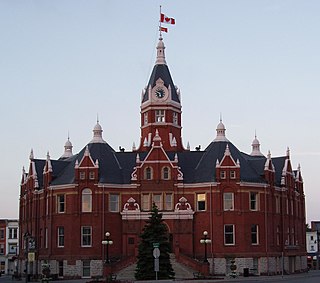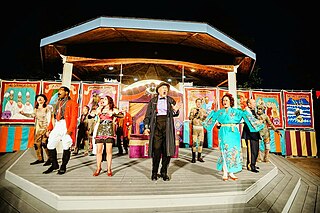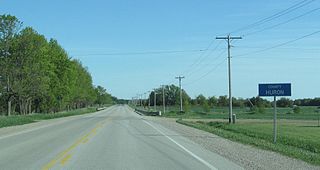
Barrie is a city, and manifesting regional centre in Central Ontario, Canada, positioned on the shores of Kempenfelt Bay, the western arm of Lake Simcoe. The city is located geographically within Simcoe County, however, it is a politically independent single-tier municipality. It is part of the historically significant Huronia region of Central Ontario and is within the northern part of the Greater Golden Horseshoe, a densely populated and industrialized region of Ontario. As of the 2016 census, the city's population was 141,434 making it the 34th largest in Canada in terms of population proper. The Barrie census metropolitan area (CMA) as of the same census had a population of 197,059 residents, making the city the 21st largest CMA in Canada. The city itself has seen significant growth in recent decades due to its emergence as a bedroom community, and its relatively close proximity to the city of Toronto. Barrie is situated approximately 86.6 kilometres (53.8 mi) from the Toronto Pearson International Airport and 109 kilometres (68 mi) from Downtown Toronto, representing the city's highly centralized and historically strategic geographical orientation and its ease of access to major centres and airports across the region.

Stratford is a city on the Avon River within Perth County in southwestern Ontario, Canada, with a population of 31,465 in 2016 in a land area of 28.28 square kilometres. Stratford is the seat of Perth County which was settled by English, Irish, Scottish and German immigrants, in almost equal numbers, starting in the 1820s but primarily in the 1830s and 1840s. Most became farmers, and even today, the area around Stratford is known for mixed farming, dairying and hog production.

Wellington County is a county located in Southwestern Ontario, Canada and is part of the Greater Golden Horseshoe. The County, made up of two towns and five townships, is predominantly rural in nature. However many of the residents in the southern part of the County commute to urban areas such as Guelph, Kitchener, Waterloo, Brampton, Mississauga, Toronto and Hamilton for employment. The northern part of the county is made up of mainly rural farming communities, except for a few larger towns such as Mount Forest and Arthur. According to the 2016 Census, the population of the County was 90,932.
Canada's contemporary theatre reflects a rich diversity of regional and cultural identities. Since the late 1960s, there has been a concerted effort to develop the voice of the 'Canadian playwright', which is reflected in the nationally focused programming of many of the country's theatres. Within this 'Canadian voice' are a plurality of perspectives - that of the First Nations, new immigrants, French Canadians, sexual minorities, etc. - and a multitude of theatre companies have been created to specifically service and support these voices.

Kincardine is a municipality located on the shores of Lake Huron in Bruce County in the province of Ontario, Canada. The current municipality was created in 1999 by the amalgamation of the Town of Kincardine, the Township of Kincardine, and the Township of Bruce.
Judith Clare Thompson, OC F.R.S. is a Canadian playwright who lives in Toronto, Ontario. She has twice been awarded the Governor General's Award for drama, and is the recipient of many other awards including the Order of Canada, the Walter Carsen Performing Arts Award, the Toronto Arts Award, The Epilepsy Ontario Award, The B'nai B'rith Award, the Dora, the Chalmers, the Susan Smith Blackburn Award and the Amnesty International Freedom of Expression Award, both for Palace of the End, which premiered at Canadian Stage, and has been produced all over the world in many languages. She has received honorary doctorates from Thorneloe University and, in Nov. 2016, Queen's University in Kingston, Ontario.

Factory Theatre is a theatre in Toronto, Ontario, founded as Factory Theatre Lab in 1970 by Ken Gass and Frank Trotz.

The Great Canadian Theatre Company (GCTC) is a professional theatre company based in Ottawa, Ontario, Canada. It was established in 1975 by a group of professors and graduate students at Carleton University. Riding a wave of cultural nationalism, founders Robin Mathews, Larry McDonald, Bill Law, Greg Reid and Lois Shannon envisioned a theatre company that would produce only Canadian plays, especially those with social and political relevance. Driven by a dream to place Canadian stories and Canadian history front and centre in our country’s universities and theatres, the company launched its first production in August 1975.
The Drawer Boy is a play by Michael Healey. It is a two-act play set in 1972 on a farm near Clinton, Ontario. There are only three characters: the farm's two owners, Morgan and Angus, and Miles Potter, a young actor from Toronto doing research for a collectively created theatre piece about farming.
Prairie Theatre Exchange (PTE) is a professional theatre in Winnipeg, Manitoba, Canada. It is located on the third floor of Portage Place mall in downtown Winnipeg. By the end of the 2016-17 season, PTE had presented 340 plays on its thrust stage over its 44 year history, 149 of which were world premieres, to an annual average attendance of 35,000 people.
Touchstone Theatre is a professional theatre company in Vancouver, British Columbia, Canada, founded in 1976 by a group of University of British Columbia theatre graduates. Touchstone's focus is on the development and production of Canadian works. Since 2016, the Artistic Director has been Roy Surette, who previously held the position in the 1990s. Former Artistic Directors are Ian Fenwick, Gordon McCall, John Cooper and Katrina Dunn, who served in that position from 1997 to 2016.
Kate Lynch is a Canadian film, television and stage actress, drama teacher, theatre director and playwright.
Opening Night was a Canadian theatrical drama television miniseries which aired on CBC Television 1974 to 1975.
Thomas Hauff is an Austrian-born Canadian actor. He is most noted for his performance in the 1979 film Summer's Children, for which he received a Genie Award nomination for Best Actor at the 1st Genie Awards in 1980.

The St Lawrence Shakespeare Festival (SLSF) runs annually in Prescott, Ontario in July and August. SLSF contracts professional actors through Canadian Actors Equity Association, is a member of PACT, and a member of the Shakespeare Theatre Association. The offerings of the Festival are based on two main stage shows that run from mid-July to mid-August as well as additional productions that are presented in shorter runs of fewer performances.
Janet Amos is a Canadian theatre actor, director, educator and playwright.
Mark Crawford is a Canadian theatre actor and playwright. He is best known for his 2016 play The Birds and the Bees, one of the most widely-produced new Canadian plays of the 2010s.










